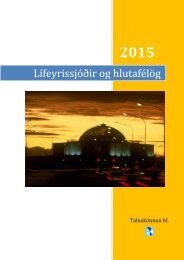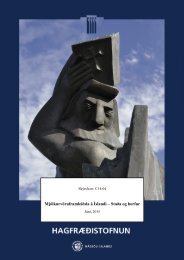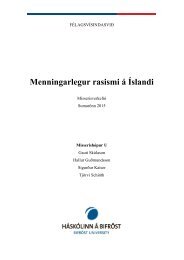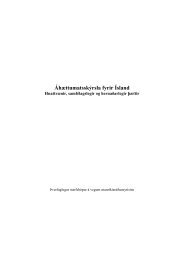Create successful ePaper yourself
Turn your PDF publications into a flip-book with our unique Google optimized e-Paper software.
WORLD REPORT 2016<br />
HUMAN RIGHTS WATCH<br />
are additional political prisoners whose cases they cannot document.<br />
Cubans who criticize the government continue to face the threat of criminal prosecution.<br />
They do not benefit from due process guarantees, such as the right to<br />
fair and public hearings by a competent and impartial tribunal. In practice,<br />
courts are subordinated to the executive and legislative branches, denying<br />
meaningful judicial independence.<br />
Graffiti artist Danilo Maldonado, known as “El Sexto,” was arrested in December<br />
2014 and charged with “contempt for authority” for attempting to stage a performance<br />
involving two pigs painted with the names “Raul” and “Fidel”—a satire<br />
of the current and former heads of state. He was released on October 20.<br />
Freedom of Expression<br />
The government controls virtually all media outlets in Cuba and restricts access<br />
to outside information, severely limiting the right to freedom of expression.<br />
A small number of journalists and bloggers who are independent of government<br />
media manage to write articles for websites or blogs, or publish tweets. However,<br />
the government routinely blocks access within Cuba to these websites, and<br />
those who publish information considered critical of the government are subject<br />
to smear campaigns and arbitrary arrests, as are artists and academics who demand<br />
greater freedoms.<br />
Only a fraction of Cubans are able to read independent websites and blogs because<br />
of the high cost of, and limited access to, the Internet. In July, Cuba increased<br />
Internet access by opening 35 Wi-Fi hot spots in parks and city<br />
boulevards nationwide. The US$2-an-hour Wi-Fi connection fee is expensive in a<br />
country where the average wage is approximately $20 a month.<br />
Travel Restrictions and Family Separation<br />
Reforms to travel regulations that went into effect in January 2013 eliminated the<br />
need for an exit visa to leave the island. Exit visas had previously been used to<br />
deny the right to travel to people critical of the government—and to their families.<br />
Since then, many people who had previously been denied permission to<br />
travel have been able to do so, including human rights defenders and independent<br />
bloggers.<br />
Nonetheless, the reforms gave the government broad discretionary powers to restrict<br />
the right to travel on the grounds of “defense and national security” or<br />
“other reasons of public interest.” Such measures have allowed the authorities<br />
to deny exit to people who express dissent. For example, José Daniel Ferrer, the<br />
leader of the Patriotic Union of Cuba (Unpacu), was denied the right to travel<br />
abroad in August for “reasons of public interest,” authorities said.<br />
The government restricts the movement of citizens within Cuba through a 1997<br />
law known as Decree 217, which is designed to limit migration to Havana. The decree<br />
has been used to prevent dissidents from traveling to Havana to attend<br />
meetings and to harass dissidents from other parts of Cuba who live there.<br />
Prison Conditions<br />
Prisons are overcrowded. Prisoners are forced to work 12-hour days and punished<br />
if they do not meet production quotas, according to former political prisoners.<br />
Inmates have no effective complaint mechanism to seek redress, and those<br />
who criticize the government or engage in hunger strikes and other forms of<br />
protest are subjected to extended solitary confinement, beatings, restrictions on<br />
family visits, and denial of medical care.<br />
While the government allowed select members of the foreign press to conduct<br />
controlled visits to a handful of prisons in April 2013, it continues to deny international<br />
human rights groups and independent Cuban organizations access to<br />
its prisons.<br />
Labor Rights<br />
Despite updating its Labor Code in 2014, Cuba continues to violate conventions<br />
of the International Labour Organization that it has ratified, specifically regarding<br />
freedom of association, collective bargaining, protection of wages and wage<br />
payment, and prohibitions on forced labor. While the formation of independent<br />
unions is technically allowed by law, in practice Cuba only permits one confederation<br />
of state-controlled unions, the Workers’ Central Union of Cuba.<br />
204<br />
205










